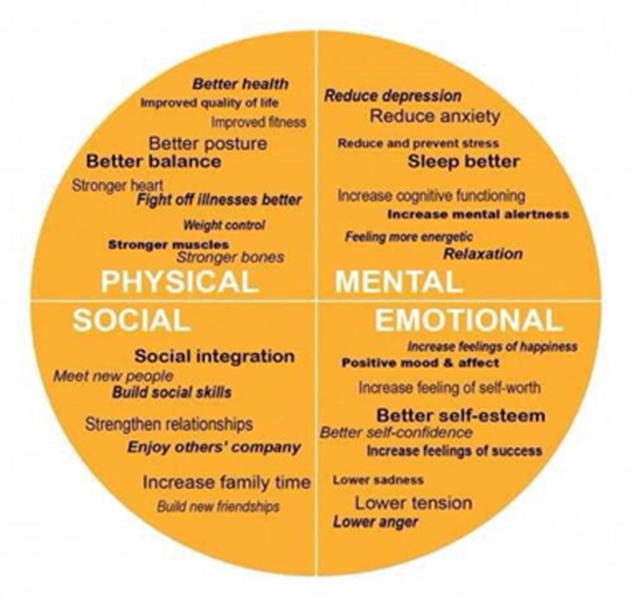| Quick Activities to Improve Your Emotional Well-Being |
| Be active—Take a dance break! Lift weights. Do push-ups or sit-ups. Or kick around a soccer ball for a few minutes. Close your eyes, take deep breaths, stretch or meditate. Write three things you are grateful for. Check in with yourself—take time to ask yourself how you are feeling. Laugh! Think of someone who makes you laugh or the last time you laughed so hard you cried. Find an inspiring song or quote and write it down (or screenshot it) so you have it nearby. |
Fall Wellness Activity – Week 4
Nov.13-20
BINGO CARD
This week’s theme is: Social, Emotional, Humor and Social Engagement
What is Social Connectedness and Why is it Important?

When you feel like you belong and have the support and care you need, as well as the number, quality and diversity of relationships you want – this is what’s known as social connectedness. People with meaningful social connections have:
- Less stress and better sleep.
- Better overall health that can lead to a longer life.
- Healthier habits and behaviors.
- Better quality of life and a sense of belonging.
How Does Social Connectedness Affect Health?
Social connectedness influences our minds, bodies and behaviors—all of which influence our health and life expectancy. Research shows that social connectedness can lead to longer life, better health and improved well-being. People are by nature social creatures. Social connections are important for our survival. Our relationships with family, friends, coworkers and community members can have a major impact on our health and well-being.
How You Can Create and Strengthen Social Connections
Improving social connections can take time. There are no official guidelines or a one-size-fits-all strategy, but these tips can help:
- Invest time in nurturing your relationships.
- Explore ways to meet new people, like joining a club or taking a class.
- Share things you already do (like exercising or having a meal) with a friend—or do new activities with them.
- Find ways to be responsive, supportive and grateful to others.
- Reduce practices that lead to feelings of disconnection from others, such as excessive social media use.
- Talk to a health care provider if you are concerned about stress, loneliness and social isolation to ensure you are taking care of your mental health.
Coping with Stress
Many of us are facing challenges that can be stressful and overwhelming. Learning to cope with stress in a healthy way will help you, the people you care about and those around you become more resilient. Stress can cause the following:
- Feelings of fear, anger, sadness, worry, numbness or frustration.
- Changes in appetite, energy, desires and interests.
- Trouble concentrating and making decisions.
- Nightmares or problems sleeping.
- Physical reactions, such as headaches, body pains, stomach problems or skin rashes.
- Worsening of chronic health problems and mental health conditions.
- Increased use of alcohol and illegal drugs.
Here are some ways you can manage stress, anxiety, grief or worry:
- Take breaks from news stories
- Take care of your body
- Eat healthy, get enough sleep, move more and sit less
- Limit alcohol intake
- Avoid using illegal drugs
- Avoid smoking
- Make time to unwind
- Connect with others
Reduce Stress in 10 Minutes and Improve Your Well-Being
More and more U.S. adults are dealing with stress, which can lead to mental health problems. Taking breaks throughout the day may help relieve stress, ease tensions or lessen worry. But we often don’t take breaks. Even 10 minutes is enough to improve your mental health. Let’s commit to taking 10 minutes today to do something for ourselves.
Additional Resources:
11 Emotional Wellness Activities To Encourage Positive Mental Health
What to Know About Emotional Health
Complete the BINGO card to win a Health & Wellness prize. Complete all four BINGO cards to enter the drawing for additional prizes at the end of the activity. Email and questions and completed BINGO cards to cmurff@roguecc.edu.
